Feminism Essay: A Comparison of Liberal and Marxist Feminism
VerifiedAdded on 2022/09/06
|7
|1634
|16
Essay
AI Summary
This essay provides a detailed exploration of feminist philosophies, focusing on the contrasting perspectives of liberal and Marxist feminism regarding sex work. The essay begins by defining feminism as a broad social and political movement advocating for women's rights and equality, and then delves into the core tenets of liberal and Marxist feminism. Liberal feminism, rooted in classical liberalism, emphasizes individual autonomy and freedom, often taking a pro-sex work stance by highlighting the importance of authentic consent. In contrast, Marxist feminism, influenced by Marxist theory, critiques the capitalist and patriarchal structures that they believe lead to the exploitation of women in sex work, advocating for a neo-abolitionist approach. The essay analyzes their views on sex trafficking, societal inequalities, and the commodification of female bodies. The conclusion highlights the differing stances of both schools of thought and suggests that liberal feminism's flexibility in acknowledging individual choice offers a more effective framework for analyzing sex work, differentiating between voluntary sex work and sex trafficking. The essay utilizes scholarly sources to support its arguments and provide a comprehensive understanding of the topic.
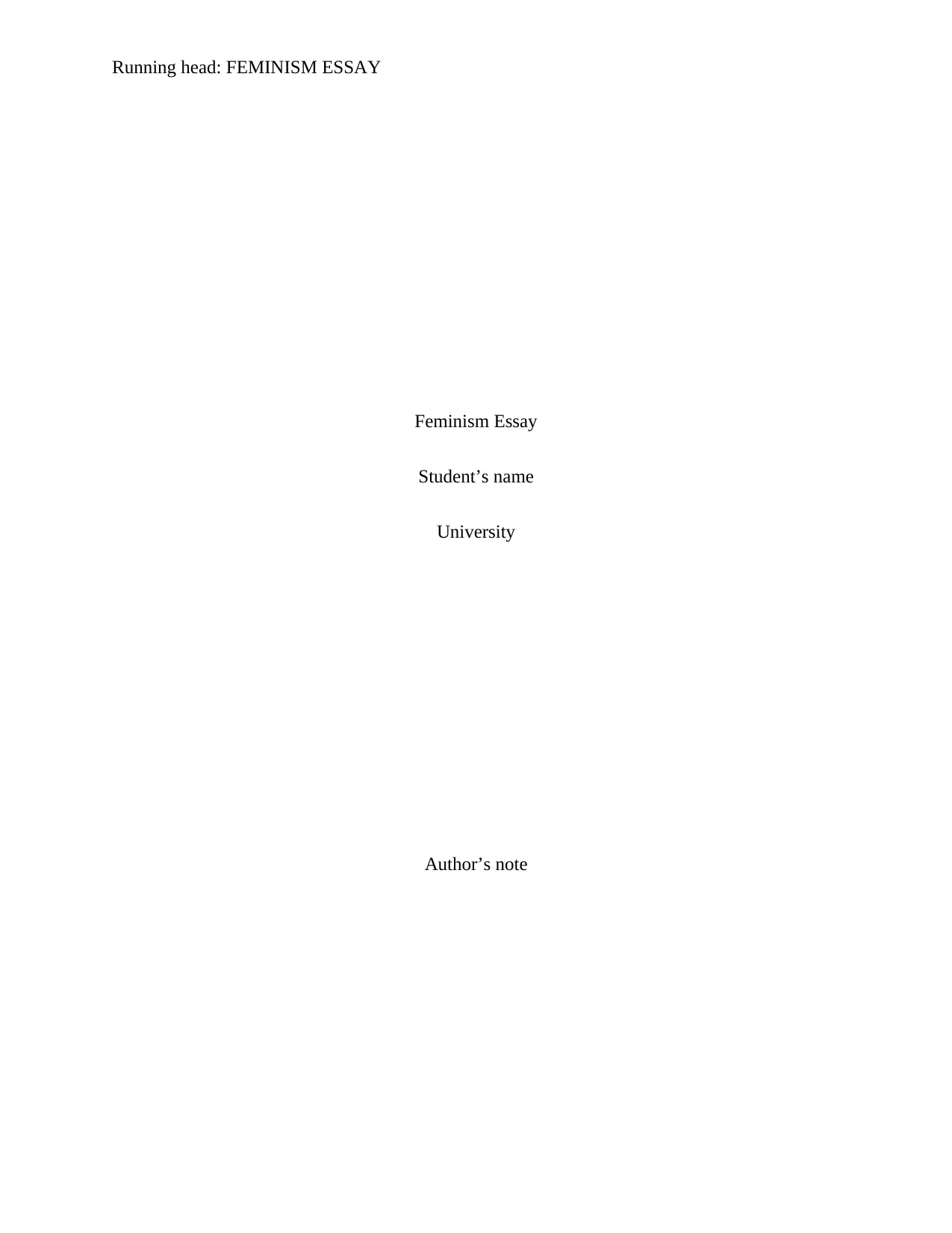
Running head: FEMINISM ESSAY
Feminism Essay
Student’s name
University
Author’s note
Feminism Essay
Student’s name
University
Author’s note
Paraphrase This Document
Need a fresh take? Get an instant paraphrase of this document with our AI Paraphraser
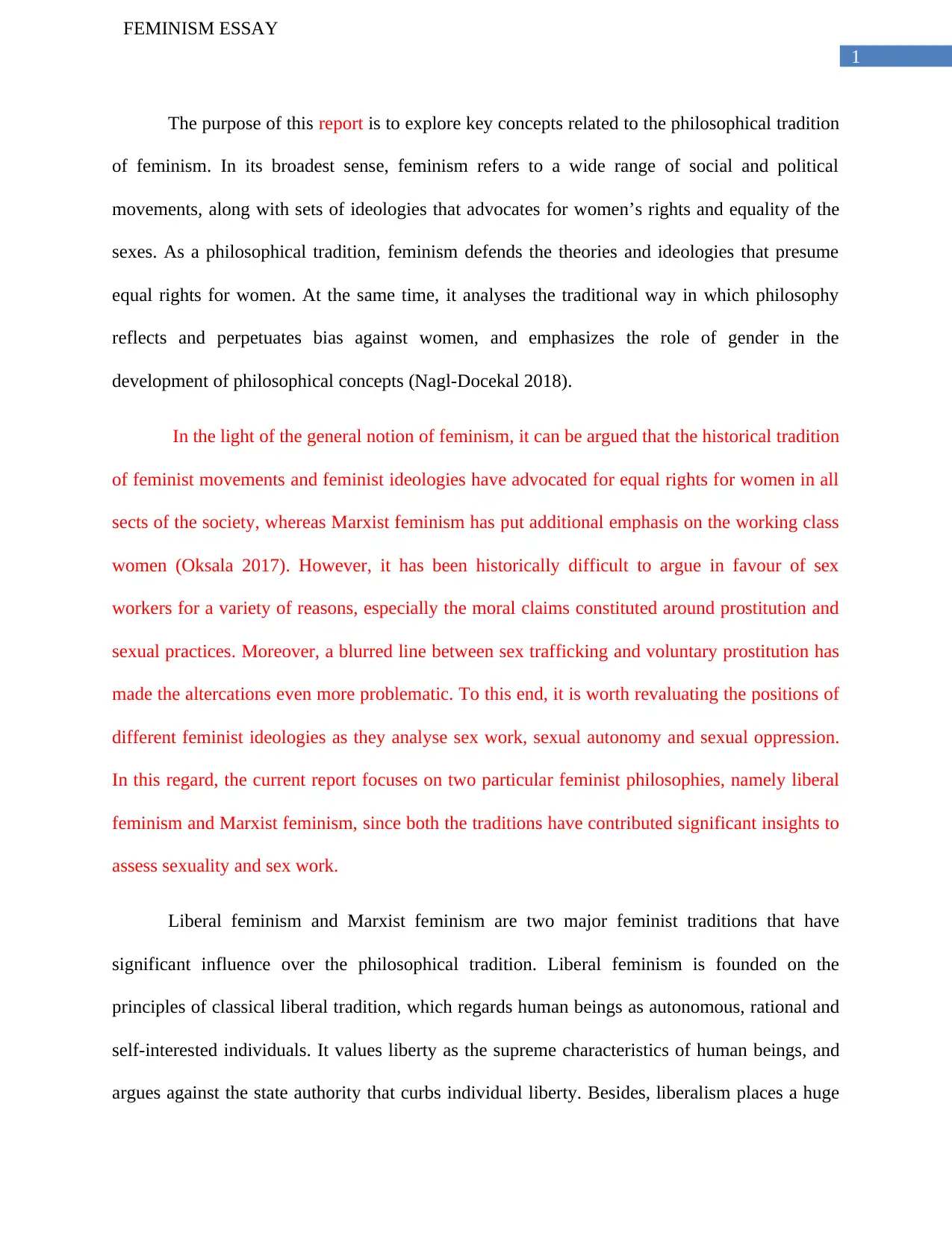
1
FEMINISM ESSAY
The purpose of this report is to explore key concepts related to the philosophical tradition
of feminism. In its broadest sense, feminism refers to a wide range of social and political
movements, along with sets of ideologies that advocates for women’s rights and equality of the
sexes. As a philosophical tradition, feminism defends the theories and ideologies that presume
equal rights for women. At the same time, it analyses the traditional way in which philosophy
reflects and perpetuates bias against women, and emphasizes the role of gender in the
development of philosophical concepts (Nagl-Docekal 2018).
In the light of the general notion of feminism, it can be argued that the historical tradition
of feminist movements and feminist ideologies have advocated for equal rights for women in all
sects of the society, whereas Marxist feminism has put additional emphasis on the working class
women (Oksala 2017). However, it has been historically difficult to argue in favour of sex
workers for a variety of reasons, especially the moral claims constituted around prostitution and
sexual practices. Moreover, a blurred line between sex trafficking and voluntary prostitution has
made the altercations even more problematic. To this end, it is worth revaluating the positions of
different feminist ideologies as they analyse sex work, sexual autonomy and sexual oppression.
In this regard, the current report focuses on two particular feminist philosophies, namely liberal
feminism and Marxist feminism, since both the traditions have contributed significant insights to
assess sexuality and sex work.
Liberal feminism and Marxist feminism are two major feminist traditions that have
significant influence over the philosophical tradition. Liberal feminism is founded on the
principles of classical liberal tradition, which regards human beings as autonomous, rational and
self-interested individuals. It values liberty as the supreme characteristics of human beings, and
argues against the state authority that curbs individual liberty. Besides, liberalism places a huge
FEMINISM ESSAY
The purpose of this report is to explore key concepts related to the philosophical tradition
of feminism. In its broadest sense, feminism refers to a wide range of social and political
movements, along with sets of ideologies that advocates for women’s rights and equality of the
sexes. As a philosophical tradition, feminism defends the theories and ideologies that presume
equal rights for women. At the same time, it analyses the traditional way in which philosophy
reflects and perpetuates bias against women, and emphasizes the role of gender in the
development of philosophical concepts (Nagl-Docekal 2018).
In the light of the general notion of feminism, it can be argued that the historical tradition
of feminist movements and feminist ideologies have advocated for equal rights for women in all
sects of the society, whereas Marxist feminism has put additional emphasis on the working class
women (Oksala 2017). However, it has been historically difficult to argue in favour of sex
workers for a variety of reasons, especially the moral claims constituted around prostitution and
sexual practices. Moreover, a blurred line between sex trafficking and voluntary prostitution has
made the altercations even more problematic. To this end, it is worth revaluating the positions of
different feminist ideologies as they analyse sex work, sexual autonomy and sexual oppression.
In this regard, the current report focuses on two particular feminist philosophies, namely liberal
feminism and Marxist feminism, since both the traditions have contributed significant insights to
assess sexuality and sex work.
Liberal feminism and Marxist feminism are two major feminist traditions that have
significant influence over the philosophical tradition. Liberal feminism is founded on the
principles of classical liberal tradition, which regards human beings as autonomous, rational and
self-interested individuals. It values liberty as the supreme characteristics of human beings, and
argues against the state authority that curbs individual liberty. Besides, liberalism places a huge
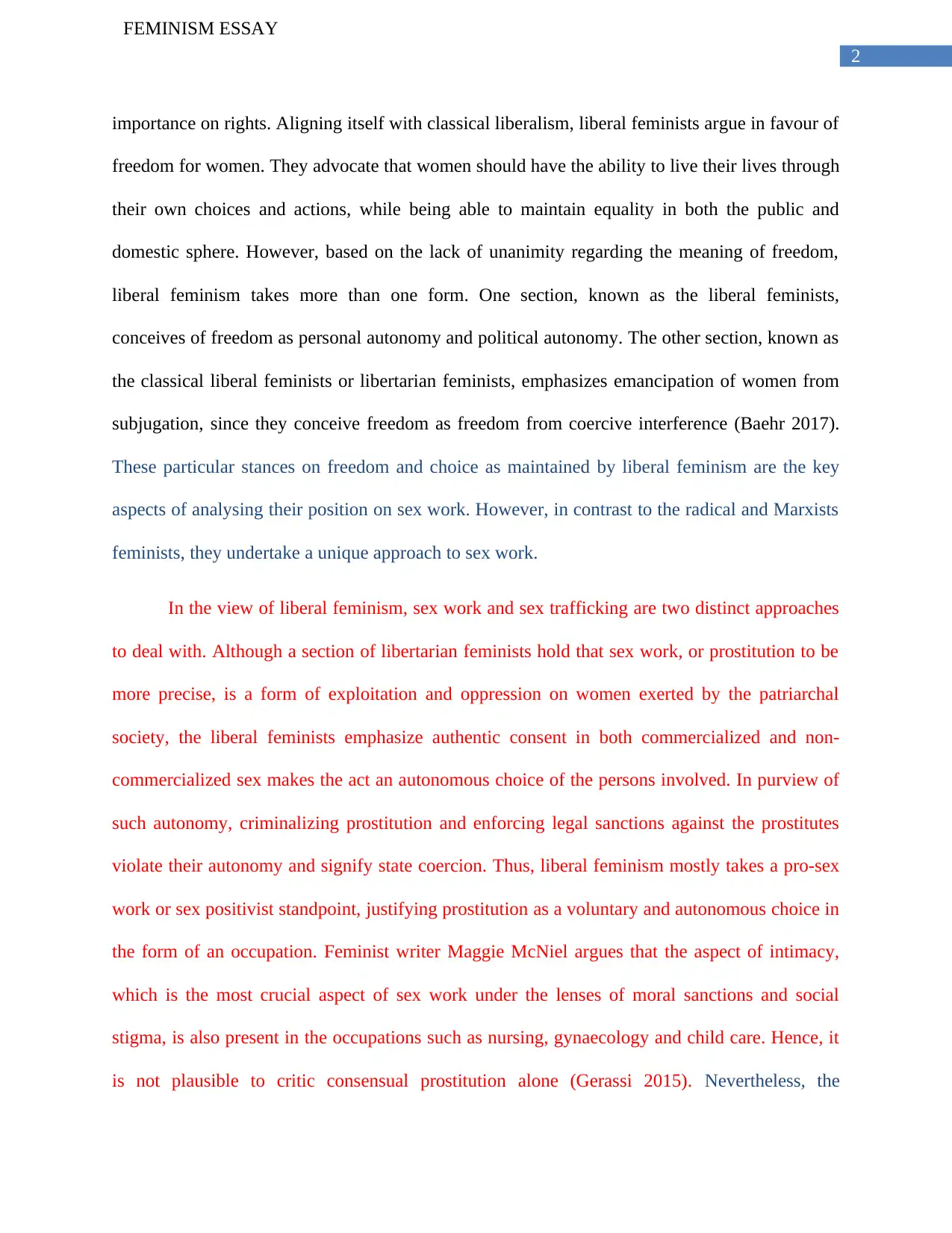
2
FEMINISM ESSAY
importance on rights. Aligning itself with classical liberalism, liberal feminists argue in favour of
freedom for women. They advocate that women should have the ability to live their lives through
their own choices and actions, while being able to maintain equality in both the public and
domestic sphere. However, based on the lack of unanimity regarding the meaning of freedom,
liberal feminism takes more than one form. One section, known as the liberal feminists,
conceives of freedom as personal autonomy and political autonomy. The other section, known as
the classical liberal feminists or libertarian feminists, emphasizes emancipation of women from
subjugation, since they conceive freedom as freedom from coercive interference (Baehr 2017).
These particular stances on freedom and choice as maintained by liberal feminism are the key
aspects of analysing their position on sex work. However, in contrast to the radical and Marxists
feminists, they undertake a unique approach to sex work.
In the view of liberal feminism, sex work and sex trafficking are two distinct approaches
to deal with. Although a section of libertarian feminists hold that sex work, or prostitution to be
more precise, is a form of exploitation and oppression on women exerted by the patriarchal
society, the liberal feminists emphasize authentic consent in both commercialized and non-
commercialized sex makes the act an autonomous choice of the persons involved. In purview of
such autonomy, criminalizing prostitution and enforcing legal sanctions against the prostitutes
violate their autonomy and signify state coercion. Thus, liberal feminism mostly takes a pro-sex
work or sex positivist standpoint, justifying prostitution as a voluntary and autonomous choice in
the form of an occupation. Feminist writer Maggie McNiel argues that the aspect of intimacy,
which is the most crucial aspect of sex work under the lenses of moral sanctions and social
stigma, is also present in the occupations such as nursing, gynaecology and child care. Hence, it
is not plausible to critic consensual prostitution alone (Gerassi 2015). Nevertheless, the
FEMINISM ESSAY
importance on rights. Aligning itself with classical liberalism, liberal feminists argue in favour of
freedom for women. They advocate that women should have the ability to live their lives through
their own choices and actions, while being able to maintain equality in both the public and
domestic sphere. However, based on the lack of unanimity regarding the meaning of freedom,
liberal feminism takes more than one form. One section, known as the liberal feminists,
conceives of freedom as personal autonomy and political autonomy. The other section, known as
the classical liberal feminists or libertarian feminists, emphasizes emancipation of women from
subjugation, since they conceive freedom as freedom from coercive interference (Baehr 2017).
These particular stances on freedom and choice as maintained by liberal feminism are the key
aspects of analysing their position on sex work. However, in contrast to the radical and Marxists
feminists, they undertake a unique approach to sex work.
In the view of liberal feminism, sex work and sex trafficking are two distinct approaches
to deal with. Although a section of libertarian feminists hold that sex work, or prostitution to be
more precise, is a form of exploitation and oppression on women exerted by the patriarchal
society, the liberal feminists emphasize authentic consent in both commercialized and non-
commercialized sex makes the act an autonomous choice of the persons involved. In purview of
such autonomy, criminalizing prostitution and enforcing legal sanctions against the prostitutes
violate their autonomy and signify state coercion. Thus, liberal feminism mostly takes a pro-sex
work or sex positivist standpoint, justifying prostitution as a voluntary and autonomous choice in
the form of an occupation. Feminist writer Maggie McNiel argues that the aspect of intimacy,
which is the most crucial aspect of sex work under the lenses of moral sanctions and social
stigma, is also present in the occupations such as nursing, gynaecology and child care. Hence, it
is not plausible to critic consensual prostitution alone (Gerassi 2015). Nevertheless, the
⊘ This is a preview!⊘
Do you want full access?
Subscribe today to unlock all pages.

Trusted by 1+ million students worldwide
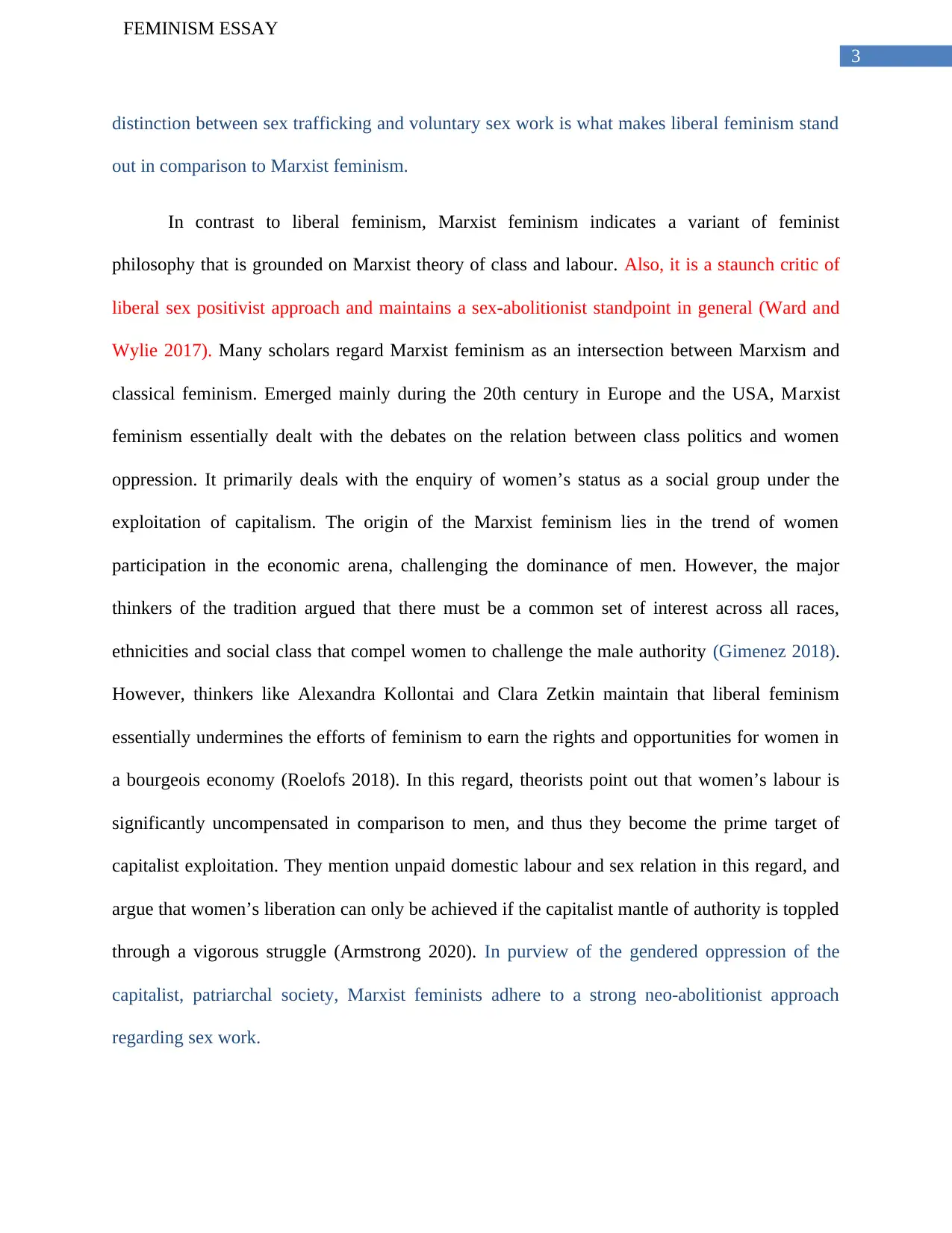
3
FEMINISM ESSAY
distinction between sex trafficking and voluntary sex work is what makes liberal feminism stand
out in comparison to Marxist feminism.
In contrast to liberal feminism, Marxist feminism indicates a variant of feminist
philosophy that is grounded on Marxist theory of class and labour. Also, it is a staunch critic of
liberal sex positivist approach and maintains a sex-abolitionist standpoint in general (Ward and
Wylie 2017). Many scholars regard Marxist feminism as an intersection between Marxism and
classical feminism. Emerged mainly during the 20th century in Europe and the USA, Marxist
feminism essentially dealt with the debates on the relation between class politics and women
oppression. It primarily deals with the enquiry of women’s status as a social group under the
exploitation of capitalism. The origin of the Marxist feminism lies in the trend of women
participation in the economic arena, challenging the dominance of men. However, the major
thinkers of the tradition argued that there must be a common set of interest across all races,
ethnicities and social class that compel women to challenge the male authority (Gimenez 2018).
However, thinkers like Alexandra Kollontai and Clara Zetkin maintain that liberal feminism
essentially undermines the efforts of feminism to earn the rights and opportunities for women in
a bourgeois economy (Roelofs 2018). In this regard, theorists point out that women’s labour is
significantly uncompensated in comparison to men, and thus they become the prime target of
capitalist exploitation. They mention unpaid domestic labour and sex relation in this regard, and
argue that women’s liberation can only be achieved if the capitalist mantle of authority is toppled
through a vigorous struggle (Armstrong 2020). In purview of the gendered oppression of the
capitalist, patriarchal society, Marxist feminists adhere to a strong neo-abolitionist approach
regarding sex work.
FEMINISM ESSAY
distinction between sex trafficking and voluntary sex work is what makes liberal feminism stand
out in comparison to Marxist feminism.
In contrast to liberal feminism, Marxist feminism indicates a variant of feminist
philosophy that is grounded on Marxist theory of class and labour. Also, it is a staunch critic of
liberal sex positivist approach and maintains a sex-abolitionist standpoint in general (Ward and
Wylie 2017). Many scholars regard Marxist feminism as an intersection between Marxism and
classical feminism. Emerged mainly during the 20th century in Europe and the USA, Marxist
feminism essentially dealt with the debates on the relation between class politics and women
oppression. It primarily deals with the enquiry of women’s status as a social group under the
exploitation of capitalism. The origin of the Marxist feminism lies in the trend of women
participation in the economic arena, challenging the dominance of men. However, the major
thinkers of the tradition argued that there must be a common set of interest across all races,
ethnicities and social class that compel women to challenge the male authority (Gimenez 2018).
However, thinkers like Alexandra Kollontai and Clara Zetkin maintain that liberal feminism
essentially undermines the efforts of feminism to earn the rights and opportunities for women in
a bourgeois economy (Roelofs 2018). In this regard, theorists point out that women’s labour is
significantly uncompensated in comparison to men, and thus they become the prime target of
capitalist exploitation. They mention unpaid domestic labour and sex relation in this regard, and
argue that women’s liberation can only be achieved if the capitalist mantle of authority is toppled
through a vigorous struggle (Armstrong 2020). In purview of the gendered oppression of the
capitalist, patriarchal society, Marxist feminists adhere to a strong neo-abolitionist approach
regarding sex work.
Paraphrase This Document
Need a fresh take? Get an instant paraphrase of this document with our AI Paraphraser
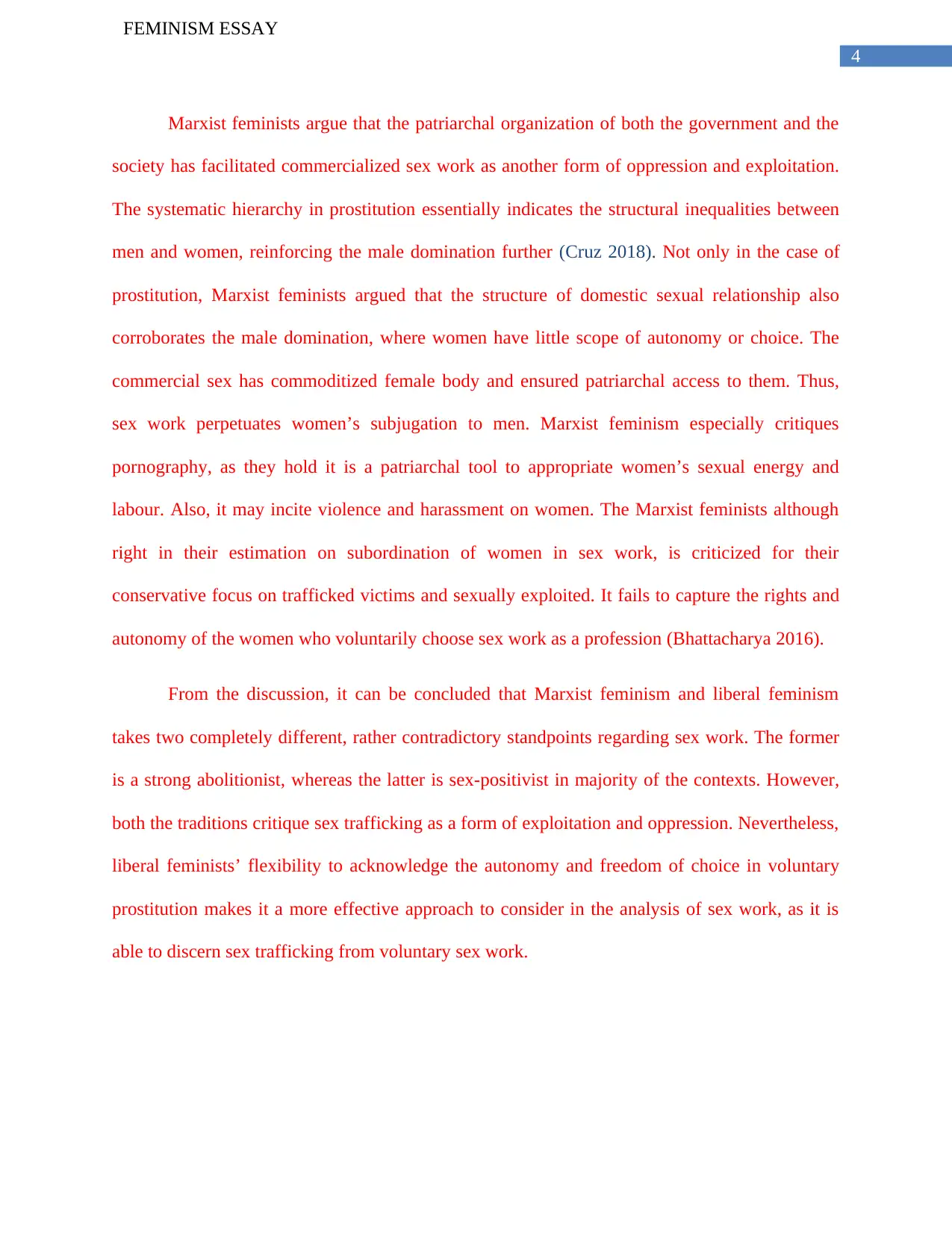
4
FEMINISM ESSAY
Marxist feminists argue that the patriarchal organization of both the government and the
society has facilitated commercialized sex work as another form of oppression and exploitation.
The systematic hierarchy in prostitution essentially indicates the structural inequalities between
men and women, reinforcing the male domination further (Cruz 2018). Not only in the case of
prostitution, Marxist feminists argued that the structure of domestic sexual relationship also
corroborates the male domination, where women have little scope of autonomy or choice. The
commercial sex has commoditized female body and ensured patriarchal access to them. Thus,
sex work perpetuates women’s subjugation to men. Marxist feminism especially critiques
pornography, as they hold it is a patriarchal tool to appropriate women’s sexual energy and
labour. Also, it may incite violence and harassment on women. The Marxist feminists although
right in their estimation on subordination of women in sex work, is criticized for their
conservative focus on trafficked victims and sexually exploited. It fails to capture the rights and
autonomy of the women who voluntarily choose sex work as a profession (Bhattacharya 2016).
From the discussion, it can be concluded that Marxist feminism and liberal feminism
takes two completely different, rather contradictory standpoints regarding sex work. The former
is a strong abolitionist, whereas the latter is sex-positivist in majority of the contexts. However,
both the traditions critique sex trafficking as a form of exploitation and oppression. Nevertheless,
liberal feminists’ flexibility to acknowledge the autonomy and freedom of choice in voluntary
prostitution makes it a more effective approach to consider in the analysis of sex work, as it is
able to discern sex trafficking from voluntary sex work.
FEMINISM ESSAY
Marxist feminists argue that the patriarchal organization of both the government and the
society has facilitated commercialized sex work as another form of oppression and exploitation.
The systematic hierarchy in prostitution essentially indicates the structural inequalities between
men and women, reinforcing the male domination further (Cruz 2018). Not only in the case of
prostitution, Marxist feminists argued that the structure of domestic sexual relationship also
corroborates the male domination, where women have little scope of autonomy or choice. The
commercial sex has commoditized female body and ensured patriarchal access to them. Thus,
sex work perpetuates women’s subjugation to men. Marxist feminism especially critiques
pornography, as they hold it is a patriarchal tool to appropriate women’s sexual energy and
labour. Also, it may incite violence and harassment on women. The Marxist feminists although
right in their estimation on subordination of women in sex work, is criticized for their
conservative focus on trafficked victims and sexually exploited. It fails to capture the rights and
autonomy of the women who voluntarily choose sex work as a profession (Bhattacharya 2016).
From the discussion, it can be concluded that Marxist feminism and liberal feminism
takes two completely different, rather contradictory standpoints regarding sex work. The former
is a strong abolitionist, whereas the latter is sex-positivist in majority of the contexts. However,
both the traditions critique sex trafficking as a form of exploitation and oppression. Nevertheless,
liberal feminists’ flexibility to acknowledge the autonomy and freedom of choice in voluntary
prostitution makes it a more effective approach to consider in the analysis of sex work, as it is
able to discern sex trafficking from voluntary sex work.
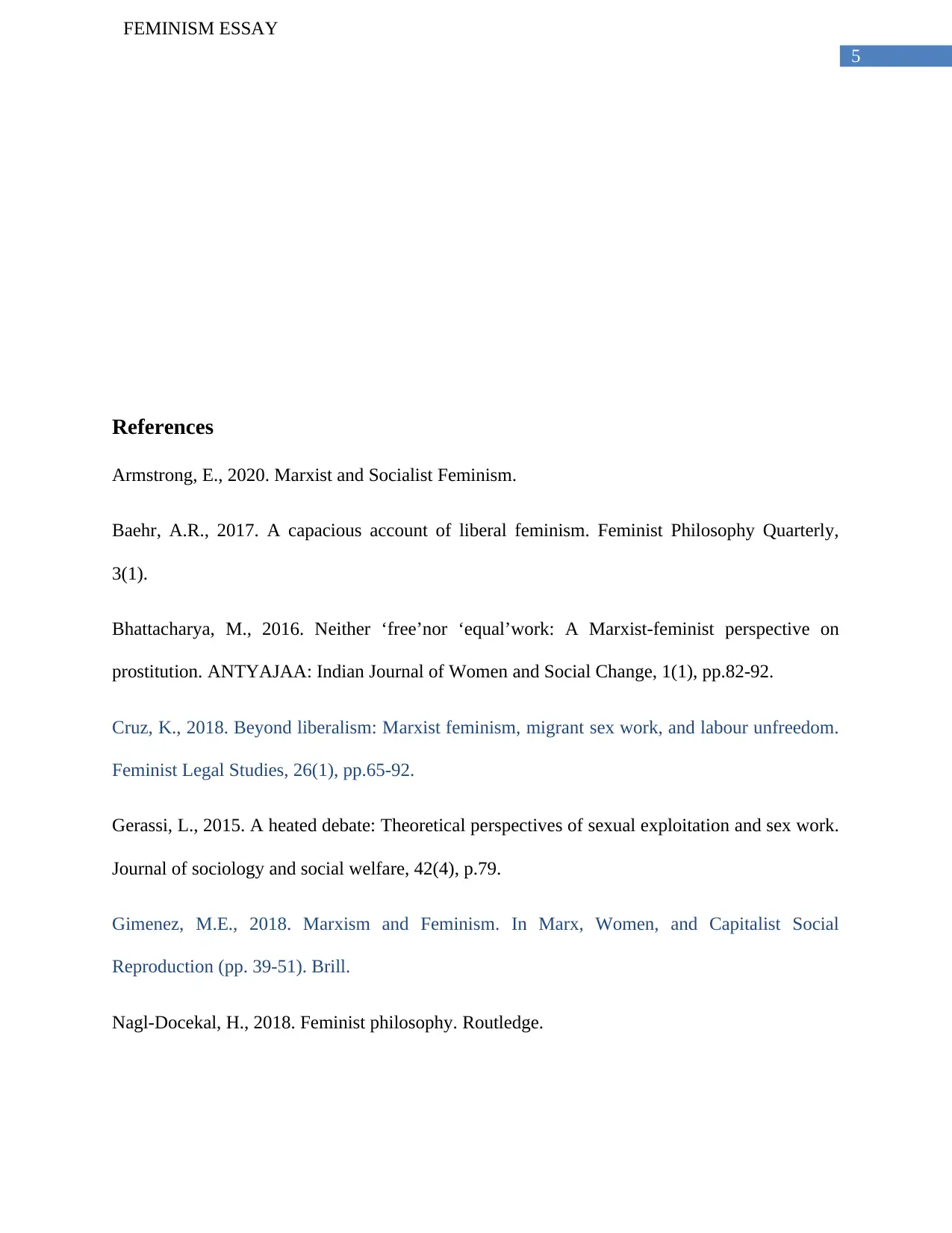
5
FEMINISM ESSAY
References
Armstrong, E., 2020. Marxist and Socialist Feminism.
Baehr, A.R., 2017. A capacious account of liberal feminism. Feminist Philosophy Quarterly,
3(1).
Bhattacharya, M., 2016. Neither ‘free’nor ‘equal’work: A Marxist-feminist perspective on
prostitution. ANTYAJAA: Indian Journal of Women and Social Change, 1(1), pp.82-92.
Cruz, K., 2018. Beyond liberalism: Marxist feminism, migrant sex work, and labour unfreedom.
Feminist Legal Studies, 26(1), pp.65-92.
Gerassi, L., 2015. A heated debate: Theoretical perspectives of sexual exploitation and sex work.
Journal of sociology and social welfare, 42(4), p.79.
Gimenez, M.E., 2018. Marxism and Feminism. In Marx, Women, and Capitalist Social
Reproduction (pp. 39-51). Brill.
Nagl-Docekal, H., 2018. Feminist philosophy. Routledge.
FEMINISM ESSAY
References
Armstrong, E., 2020. Marxist and Socialist Feminism.
Baehr, A.R., 2017. A capacious account of liberal feminism. Feminist Philosophy Quarterly,
3(1).
Bhattacharya, M., 2016. Neither ‘free’nor ‘equal’work: A Marxist-feminist perspective on
prostitution. ANTYAJAA: Indian Journal of Women and Social Change, 1(1), pp.82-92.
Cruz, K., 2018. Beyond liberalism: Marxist feminism, migrant sex work, and labour unfreedom.
Feminist Legal Studies, 26(1), pp.65-92.
Gerassi, L., 2015. A heated debate: Theoretical perspectives of sexual exploitation and sex work.
Journal of sociology and social welfare, 42(4), p.79.
Gimenez, M.E., 2018. Marxism and Feminism. In Marx, Women, and Capitalist Social
Reproduction (pp. 39-51). Brill.
Nagl-Docekal, H., 2018. Feminist philosophy. Routledge.
⊘ This is a preview!⊘
Do you want full access?
Subscribe today to unlock all pages.

Trusted by 1+ million students worldwide
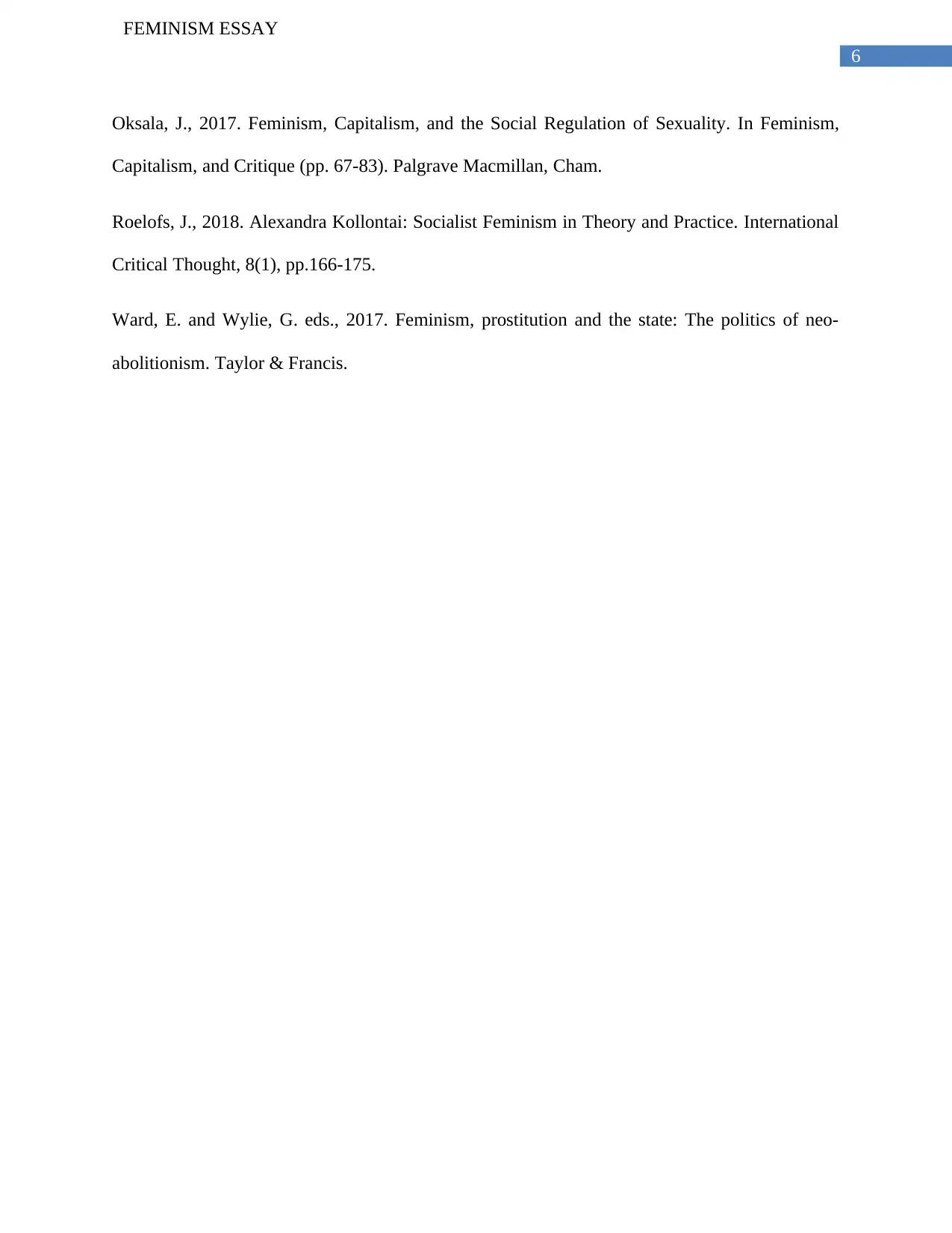
6
FEMINISM ESSAY
Oksala, J., 2017. Feminism, Capitalism, and the Social Regulation of Sexuality. In Feminism,
Capitalism, and Critique (pp. 67-83). Palgrave Macmillan, Cham.
Roelofs, J., 2018. Alexandra Kollontai: Socialist Feminism in Theory and Practice. International
Critical Thought, 8(1), pp.166-175.
Ward, E. and Wylie, G. eds., 2017. Feminism, prostitution and the state: The politics of neo-
abolitionism. Taylor & Francis.
FEMINISM ESSAY
Oksala, J., 2017. Feminism, Capitalism, and the Social Regulation of Sexuality. In Feminism,
Capitalism, and Critique (pp. 67-83). Palgrave Macmillan, Cham.
Roelofs, J., 2018. Alexandra Kollontai: Socialist Feminism in Theory and Practice. International
Critical Thought, 8(1), pp.166-175.
Ward, E. and Wylie, G. eds., 2017. Feminism, prostitution and the state: The politics of neo-
abolitionism. Taylor & Francis.
1 out of 7
Related Documents
Your All-in-One AI-Powered Toolkit for Academic Success.
+13062052269
info@desklib.com
Available 24*7 on WhatsApp / Email
![[object Object]](/_next/static/media/star-bottom.7253800d.svg)
Unlock your academic potential
Copyright © 2020–2026 A2Z Services. All Rights Reserved. Developed and managed by ZUCOL.





